|
Group Contacts
Acadian Group
Chair: Harold Schoeffler
cadistyle@aol.com
Vice Chair and Group representative to the Delta Chapter Exom:
Woody Martin
hrmartin2sc@mail.com
Billy Fortier
billyfortier@yahoo.com
Baton Rouge Group
Chair (acting chair): Nancy Grush,
nancygrush@gmail.com
Vice-Chair: vacant
Member: Ann Vail Shaneyfelt,
Newsletter Co-Editor,
Delta Chapter Recycling Chair ashaneyfelt@gmail.com
John Westra,
Group Representative to the Delta Chapter,
jwestra@agctr.lsu.edu
Treasurer: Gwen Pine, gpine716@bellsouth.net
Honey Island Group
Chair: Vacant
Treasurer: Diane Casteel
999diane@gmail.com
Chapter Delegate Frank Neelis
bucktree@bellsouth.net
Jim Long
jlong24@bellsouth.net
Caryn Schoeffler
cschoeffler54@gmail.com
Kisatchee Group
Jeff Wellborn group rep
jwellborn@seaber.com
New Orleans Group
Vance Levesque,Chair,
Membership Chair
mrkahuna@juno.com
Natasha Noordhoff, Vice Chair
nnoordhoff@gmail.com
Wendy King, Secretary
wking@tulane.edu
James Guilbeau, Treasurer
guilbea@attglobal.net
Barry Kohl, Conserv Chair
Bkohl40@cs.com
Rene' Maggio, Webmaster
tonirene@bellsouth.net
Charles Pfeifer, Program Chair
|
|
Chapter Contacts
Delta Chapter
Chair: Haywood (Woody) Martin
hrmartin2sc@gmail.com
Vice Chair: Charlie Fryling
cfryling@me.com
Secretary: Open
Treasurer: John Westra
John.v.westra@gmail.com
Conservation Chair Willie Fontenot
wafont@cox.net
Stacey Scarce
naturehiker@bellsouth.net
Barry Kohl bkohl40@cs.com
Dean Wilson ENAPAY3@aol.com
Jeff Wellborn jwellborn@seaber.com
Nancy Grush nancygrush@gmail.com
Harvey Stern hstern@bellsouth.net
Chapter Organizer:
Devin Martin (985) 209-5454
Devin.Martin@sierraclub.org
Newsletter
and Bookkeeping Support: Leslie March
lesliemarch@hotmail.com
Webmaster
Rene Maggio tonirene@bellsouth.net
Website:
www.louisiana.sierraclub.org
 |
|
Regional Club Sierra Club Regional Office 716 Adams St., |
|
GroupChapter Calendar
Upcoming Events
SAVE THE DATE
3rd Annual Hands Across the Sand
August 4, 2012
12:00pm
New Orleans, Louisiana
Join the Sierra Club and the Gulf Future Coalition for this international event to raise awareness about the consequences of offshore drilling and the need for community voices as the Gulf Coast recovers from the BP Oil Disaster.
Location to be announced.
For More Information, Please Contact:
Jordan Macha, Sierra Club, 504.861.4837 / jordan.macha@sierraclub.org
Group Events
The Acadian Group meets the second and third Wednesday of the month. Check out their web page for current information and to find out about outings.
The Baton Rouge BR Group meets on third Thursdays of the month at 7 p.m. At the Backpacker at 7656 Jefferson Hwy in Baton Rouge every other month. On alternate months, there's usually an outing. Call Nancy Grush at (225) 938-9353 for more info.
Issues include: protecting the rapidly disappearing wetlands; ensuring the UDC is followed; urging that Future BR is implemented; & advocating transit & more amenities for pedestrians & cyclists. We are also bringing recycling to Ascension Parish.
New Orleans Group meets monthly at the Audubon Zoo. Click on this link for more information or find them on facebook. |
|

Outings
Honey Island Swamp Hike
Retraces Old Steps
 | | Sierra Hikers |
On May 19, ten people set out to hike the Honey Island Swamp Nature Trail, just off Old Hwy 11 in the middle of the Pearl River Wildlife Management Area northeast of Slidell.
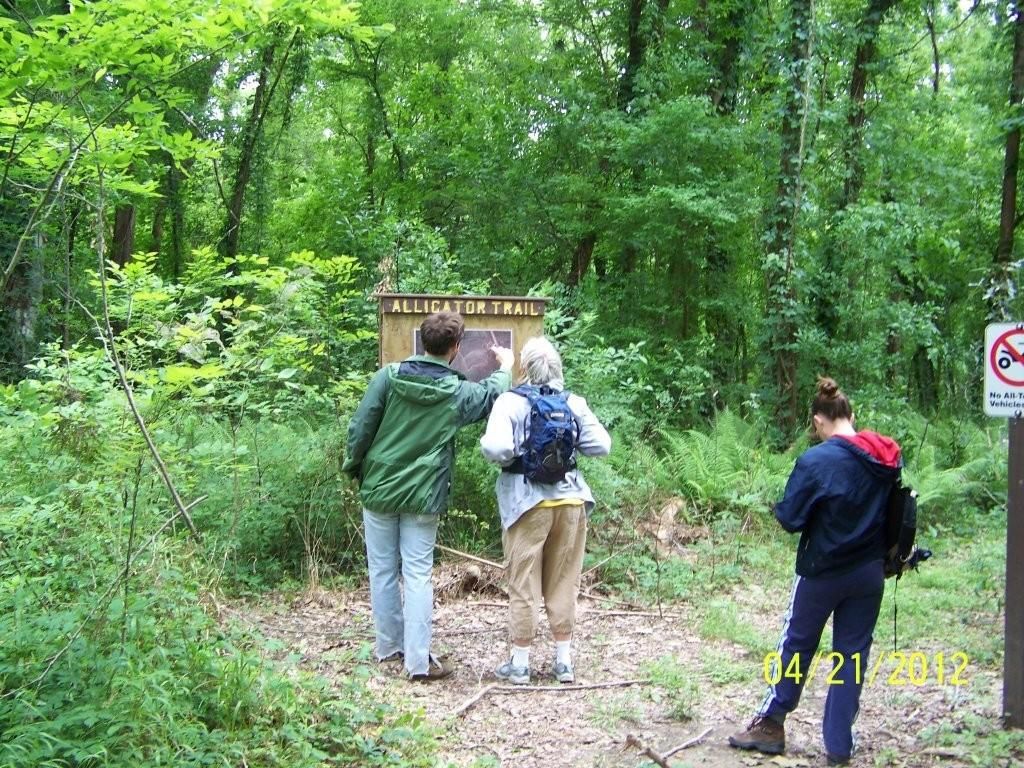 | |
Checking out the route |
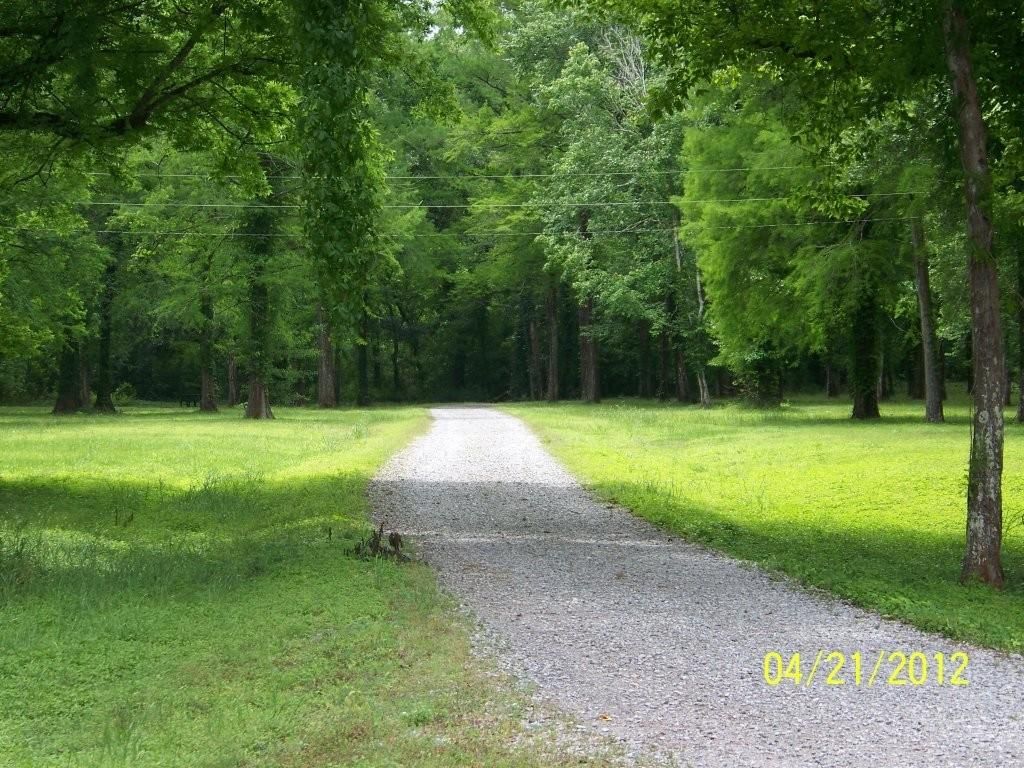 | |
Following the path |
In doing so, they retraced the steps and hard work of Sierra Club member Robert Murray. Robert worked together with Louisiana Department of Wildlife and Fisheries and intrepid Sierra Club volunteers to identify, trailblaze, improve this trail. At one time, trail maps and plant identification plaques were available to hikers. Hurricane Katrina caused enormous damage and disruption to the original Honey Island Swamp trail, as well as the organization and activities of the Honey Island Sierra Club Group. With your help, though, we can restore this trail and rebuild the local Group to ensure that future generations of people will be able to Enjoy, Explore, and Protect the Northshore area.
Baton Rouge Group
Hikes to Port Hudson
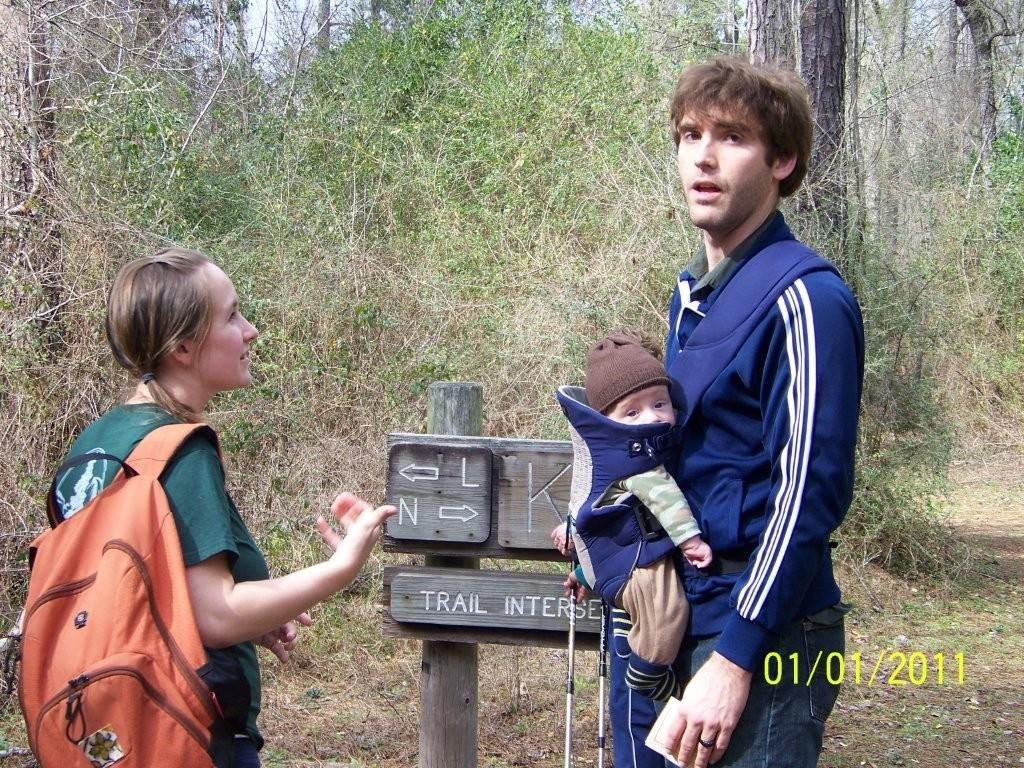 | | Finley Martin takes a Hike |
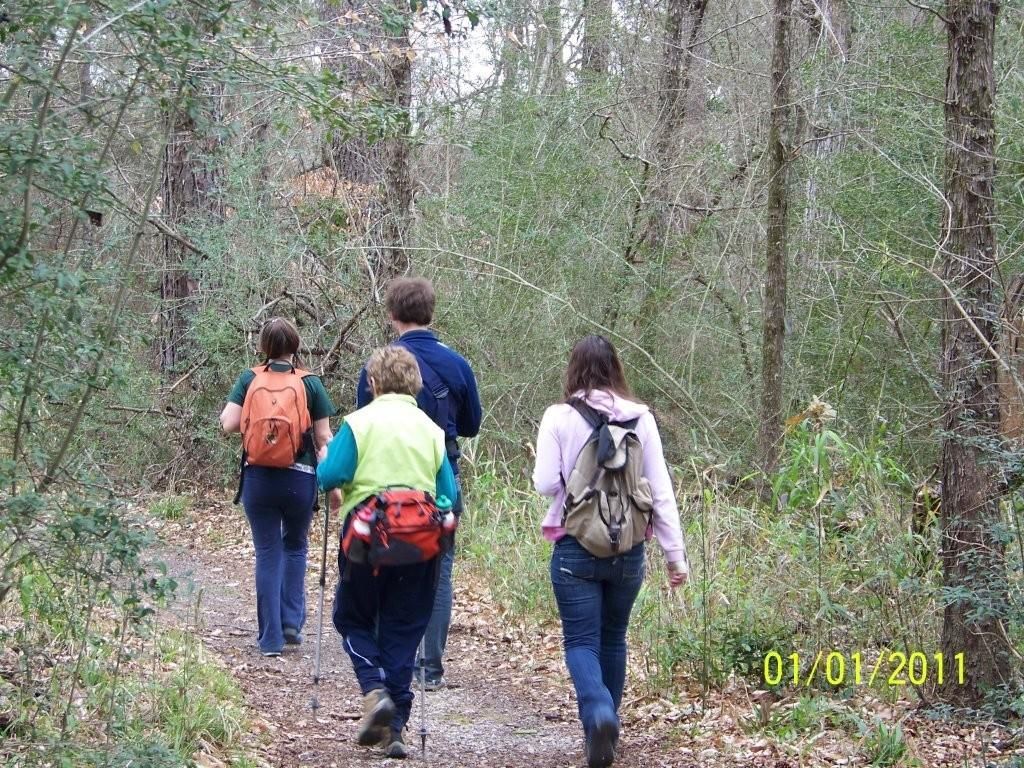 | | Baton Rouge Members |
|
|
Chapter Retreat 2013
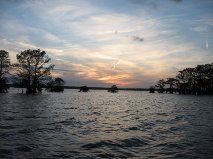
Sunset at Lake Fausse Point State Park.
Chapter Retreat News
Next year is March 15-17, 2013
This year's retreat was March 16 through the 18th, 2012. We did birding, map and compass, knot tying, canoe paddling, took Harold's party boat out among the lake cypress, and did some good eating. We might change up the program a little for next year but Lake Fausse Point is such a great state park that we plan to go back there for the chapter retreat next year.
Dates for next year will be March 15-17, 2013 so mark your calendar now and let us know any time but not later than Feb 8, 2013 if you want to reserve a sleeping spot in one of the very nice cabins that we have reserved. And let us know if you would like to be involved in putting on the event. Many hands make light work and more fun. Contact Woody Martinhrmartin2sc@gmail.com
|
|
New Chapter Website
Rolls Out
August 1, 2012
On August 1 of this year, look for the Delta Chapter's new and improved website. The address will remain the same at ttp://louisiana.sierraclub.org. We hope to have a website that is more user-friendly, accessible, and content-driven than before.
Today's interconnected, digital world means that more and more of our work is happening online-so stay in touch and keep updated by making sure that the Delta Chapter has your email address. And if you haven't done so already, find us on Facebook. |
|

www.louisiana.sierraclub.org
About Us
The Delta Sierran is published four times a year by the Delta Chapter of the Sierra Club. Articles and editing by local volunteers. Production by Penguin Platitudes.Text of articles may be reprinted if duly acknowledged.
Artwork and photos may not be reproduced without permission.
The Delta Chapter is 3,000 of your neighbors supporting the work of the Sierra Club in Louisiana. We advance the cause of protecting Louisiana's environment in a variety of ways, including lobbying the state legislature in Baton Rouge to create clean jobs,develop renewable resources like wind and solar and most important to protect our natural heritage for our families and future generations.
We work to save the Cypress, keep the Atchafalaya Wet and Wild and promote restoring our wetlands,
the natural coastal barriers. We also go outside and enjoy our beautiful planet with canoe trips, hikes and camp outs.
Contributions and Announcements
for the next issue of the Delta
Sierran should be sent no later than September 15, 2012. This issue will be our print edition so we have to meet this deadline. Please forward material
via email to lesliemarch@hotmail.com. |
|
Take Action
Over the past few months, over 5,000 people have sent a message to EPA calling on the EPA to regulate toxic oil dispersants...but there's more work to be done!
WILL YOU HELP SPREAD THE WORD ABOUT TOXIC OIL DISPERSANTS BY WRITING A LETTER TO THE EDITOR?
By writing a letter to the editor, your voice can make a real difference in the fight for a healthier Gulf Coast. A letter to the editor from a community member brings this issue to new audiences and shows our leaders that we will hold them accountable until we see action.
We've got everything you need to get started right away! Let us know you want to sign up and you'll receive talking points, example letters, and instructions on submission.
Thanks for all you do! Look forward to hearing from you.
For more information, please contact:
Jordan Macha, Gulf States Representative jordan.macha@sierraclub.org / 504.861.4837
Visit http://action.sierraclub.org/gulfscience to sign our petition demanding regulations for oil dispersants!
|
|
Act Now for
Energy
Efficiency | |
In the coming months, the Louisiana Public Service Commission will be casting its vote to implement rules for a statewide Energy Efficiency Resource Standard (EERS). This policy will help residents and industry alike to make their homes and businesses run more efficiently and save money! Currently, Louisiana has some of the highest utility bills in the country, even though our energy rates
are low. Implementing the EERS will not only help lower our energy costs across the state but can create and sustain jobs, and spur new energy growth.
Louisiana is currently leading the region with the most complete set of clean energy policies - helping to keep Louisiana beautiful, sustainable. Let your Commissioner know that you want the maximum economic and environmental benefits for our state!
Call your Commissioner today and let him know that you want strong rules for the Energy Efficiency Resource Standard!
Don't know which district you are in?
- 504.846.6930 / 1.800.228.9368
225.342.6900 / 1.800.256.6004
504.680.9529 / 1.800.256.9413
318.748.4715 / 1.800.256.2490
318.676.7464 / 1.800.256.2412
|
The New Orleans Group News
 | |
New Orleans Group
Members at Cane Bayou |
The New Orleans Group of the Sierra Club has embarked on an adventure - following a path that has been well trodden in the past but has not been clearly marked for almost 15 years. The Group's Outings Committee has engaged local Sierra Club members and residents in the task of updating the Group's Trail Guide, which was the Bible of local trails from the 1980s through 1997, when it was last published.
A revision of the grassroots document was underway when Hurricane Katrina hit the region, but that changed everything. Now the Group is having regular outing-trainings for folks interested in becoming Trail Blazers, so they learn the ropes of how to successfully scope a trail from the 1997 Guide and turn it into an updated article.
The Committee has conducted five trainings where more than 50 people attended, including one June 30 on Cane Bayou lead by long time Club member Byron Almquist, but only half a dozen or so trails have been scoped so far. With more than 100 trails inthe last Guide, some of which are in Mississippi and Central Louisiana, there is a great opportunity for folks who love outdoor adventure to learn a new, beautiful place and help the Sierra Club at the same time by assisting with the revision of the Guide. Eventually, the Guide will be sold as a fundraiser for the Group and an online version will provide teasers and otherwise provide some information about the trails in the Guide without putting the entire book online.
For more information about the project or about joining the Trail Blazers, please contact Colleen Morgan, Outings Committee Chair, at tcolleen526@gmail.com.
See below for more information about the trail guide and guidelines for blazing trails.
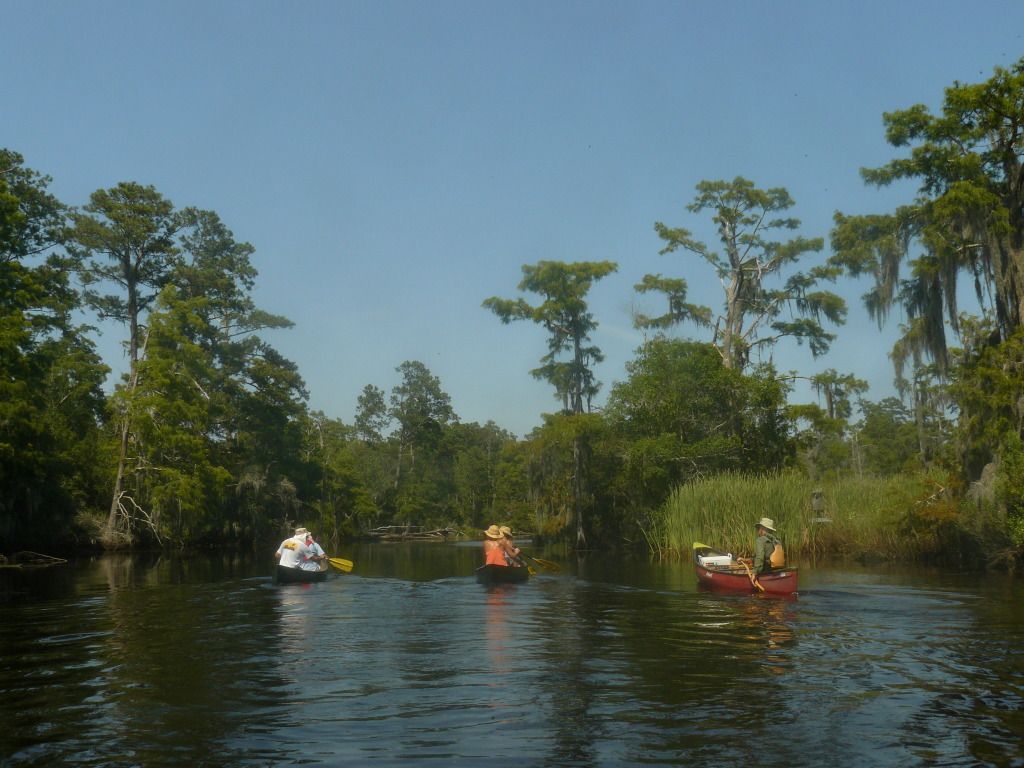 | |
Trail Blazing on Cane Bayou |
|
|
Trail Guide Guidelines
The Delta Chapter of the Sierra Club was in its infancy when Byron Almquist put together some mimeographed sheets and leaflets in envelopes and sold this under the name Outings Kit. By 1992, it was a highly popular guide edited by John Sevenair and illustrated by the late Jeanne De la Houssaye.
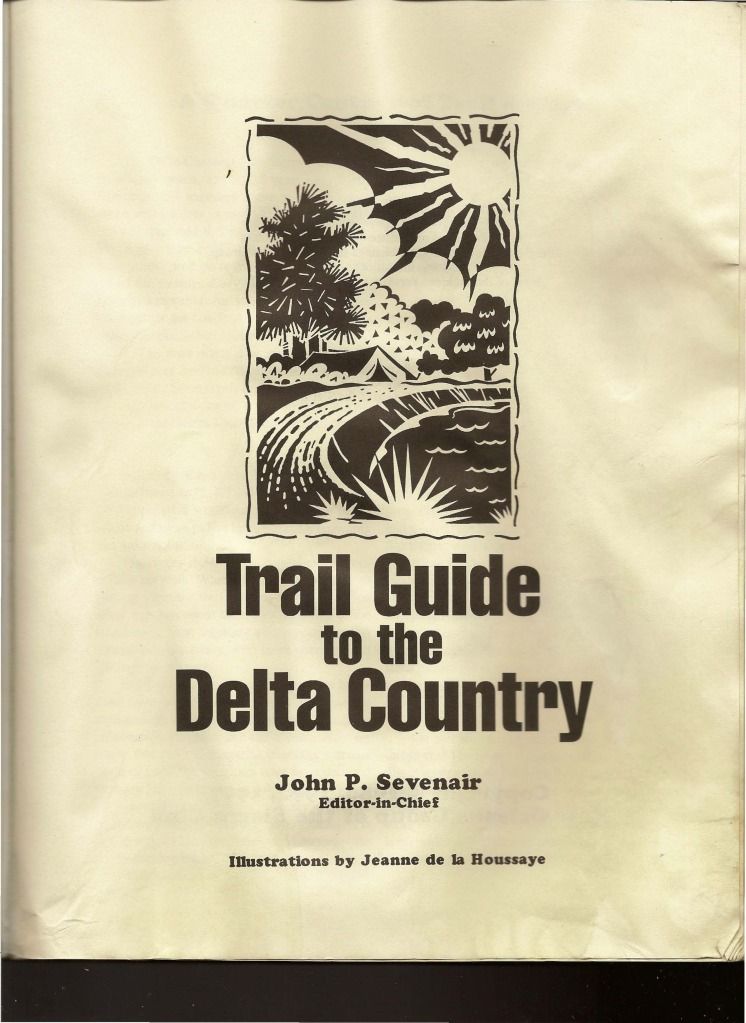
With the aftermath of Katrina changing the landscape in innumerable ways, and with a reemphasis to get people outdoors, the decision was made to enroll people to update as many of the 100 hiking, biking and canoe trails as possible, and add any new ones since 1992.
Scouting and Writing Procedure
Step 1: Email Vance Levesque (mrkahuna@juno.com) to get the map of trails in the old Trail Guide.
Step 2: After you have seen the pdfs, decide which trails you would like to scout
Step 3: Get out there! Take lots of notes, take some pictures, use the categories on the checklist below to get started. Have Fun!
Step 4: Condense your notes into a brief article that you noted while on the trail. Make sure to include fun flora/fauna details and perhaps anecdotes to illustrate the experience. Email this first draft to Devin Martin (devin.martin.sc@gmail.com) AND Colleen Morgan (tcolleen526@gmail.com).
CHECKLIST:
Type of Trail:
Region:
Name of Trail:
Site Scoper:
Parking (suggested v. unsafe):
Level of difficulty:
Type of ecosystem:
Length of trail:
Normal duration of trip:
Cover (i.e. closed canopy, full sun):
Typical wildlife sightings:
Camping along the route?:
Getting there (directions to trailhead/put-in):
Suggested route with landmarks:
Interesting notes:
Resources:
Contact information for conditions:
Map:
Weather (bad weather for trail?):
Supply list (make sure enough water):
Safety information:
Dangers/important information:
Construction on the route (signage? Duration?):
With your help we can get people outdoors again!! Isn't that one of the main reasons you joined the Sierra Club in the FIRST place. And you will finally be given credit for your trail!!!!
Photos from original Trail Guide |
|
The Sierra Club Nuclear Free Campaign kicks off

The Sierra Club Activist Network is made up of many teams that are based on a particular issue. Members and non-members of the club engage online in a social network type space. The No Nukes Activist Team has 146 members so far representing most of the 50 states in the US and some members from the Great Lakes area in Canada.
Using a grant opportunity provided by the club, the team organized a national strategy summit in Washington DC in early May. Eighty five Sierrans attended. The three days were spent listening to the latest nuclear news from experts, networking and working on a national strategy plan.
This effort is volunteer driven with assistance from the Activist Network staff. Included in the long term plan are fundraising plans to build this campaign to complement the existing Beyond Campaigns.
Sierra Club policy has for many years been concerned with the health and safety issues of nuclear power. In addition we recognize the economic and environmental costs associated with nuclear power. It doesn't fit in with our plan for lower greenhouse gases, increased energy efficiency and clean renewable energy.

In Louisiana, we have Waterford and RiverBend, that we need to be concerned about as well as an additional plant, Grand Gulf that is located very close to our border in Mississippi. We also have our share of radioactive waste stored in inadequate dumps.
Our conservation chair, Willie Fontenot is a member of the No Nukes Activist Team. Willie has a historical perspective on radioactive issues in Louisiana.
The team is looking for additional members, all you need to do is go to
the Sierra Club Activist Network website, join the No Nukes team. Check out all of the other team opportunities and you could start your own team regarding any environmental issues that are important to you, for example a team dedicated to protecting the Atchafalaya.
Check out Sarah Hodgdon's Blog at Treehugger. | |
|
|
Letters to the Editor
Acension Parish Curbside Recycling
Leslie:
I don't have time to write an article - but I am sending you what we sent out to get support of the community for curbside recycling in Assumption Parish. The meeting that is referenced turned out to be a win for us. The RFP process is going ahead. The council will draft the RFP, send it out, then vote on up to 3 businesses to award a franchise to. This is the only way we will get curbside recycling in the parish - it is a definite win. The people opposing us are in support of "small business" and are claiming government interference with their lives (ie: big government/socialist). Ironically, the Councilman leading the charge to get us recycling is a Republican. He is also the one trying to get us more parks and bike paths, etc. He's more green than he likes to admit. I can also send video of more news pieces that were done.
Here is what I wrote the other day to get support from the community:
Recyclers, Friends, Ascension Parish Residents:
Tonight in Donaldsonville's Courthouse at 6PM, the fate of curbside recycling in Ascension Parish is being decided. The RFP for for a parish waste contract is again being debated and a final vote is expected to be cast tonight. If you have not been following this in the news, I have included a link to get you up to speed. The current RFP has been expanded to allow up to 3 groups to "win" permission to do business (aka: a franchise) in the parish due to pressure from some small local waste haulers who fear that they can not compete or provide all of the services that the parish is now requiring.
http://www.wbrz.com/news/ascension-parish-trash-pickup-could-get-cheaper/
As I understand it, in order to be granted permission to do business in our parish under the new RFP, the waste haulers must be able to provide all of the following services required by the parish. These services that the parish wishes to provide for us include:
- Waste Hauling 2x a week
- Curbside Recycling 1x a week
- Brush Pick up (aka: woody waste) (once a week)
- White Goods and bulk items Pick up (once a month)
Under this new RFP, small businesses such as Dale's (who alone may not be able to provide all the services now required by the parish) will have the ability to team up with other businesses (such as a recycling company like Cajun Recycling) on the RFP. This will still allow them to compete and potentially maintain their business in the parish.
If the small businesses such as Dale's have their way, this will not pass and we will NOT have parish curbside recycling. Its is up to you to decide if the special interest of a few small businesses is greater than that of the people of the parish who desire curbside recycling and expanded waste hauling services. Please attend tonight's meeting and be part of the process. If you are not able to attend tonight's meeting - please email or call your councilman: Link to Parish Council Contacts (our councilman - Chris Loar: cloar@apgov.us is a supporter of curbside recycling.)
Meeting Location tonight: Regular Council Meeting, 6PM
Donaldsonville Courthouse
300 Houmas Street - 2nd Floor - Donaldsonville, LA
Ann Vail Shaneyfelt
Ascension Forward
Editor: Congratulations to Ann, she has been working toward this goal for years. Those of us who worked on getting New Orleans recycling back know what an uphill battle this has been. If you would like to give her a hand, contact her at ashaneyfelt@gmail.com.
Words from Willie Fontenot on the Cypress Dedication
Dear Leslie,
I am really glad to learn that Barry sent you these pictures of himself, Frank Ehret, Harvey Stern and me at the dedication of the older cypress tree which is very visible along the primary trail at the Jean Lafitte National Park. This trail takes one from the visitor center through the cypress trees near the bank of the Mississippi River to a section of coastal marsh which is at the upper area of the Barataria Estuary. The views are stunning and to be able to see that many ecosystems in one short walk is a real breath taking experience.
Last year we had a meeting of the Louisiana Audubon Council at the Jean Lafitte National Park and Barry, Harvey and I walked down this boardwalk trail to see if we could identify one or more older cypress trees which might be participants in the 2012 state celebration of becoming a part of the United States this year. Sure enough we saw several trees which were excelent candidates and the one selected was already identified by a plaque put out by the Natinal Park Service. Until Harvey went out and cored the tree a few months ago no one knew the age of this tree.
At the dedication of the tree, in Barry's photographs, there was a group of younger students who were there to learn more about the park and the trees. Before the ceremony started I asked Frank to tell us his age an, 96, and I pointed out that the tree we were there to recognize is more than 500 years older than Mr. Frank.Probably the only reason that this and other trees in the park are still standing is because of the incredible work of Frank Ehret and many others but Frank led the efforts to establish the park and save the trees.
Now this tree can continue growing for another 1,000 years and future visitors to the park will know more about the wetlands they are walking through. Hopefully we will be able to stop the massive coastal erosion problems which threaten the future of this and many other trees and the park.
Sincerely yours,
Wilie
Editor: Frank Ehret is 96 and still going. A reason that I hear about volunteering sometimes is " I'm too old". Frank is an example to us all that we can contribute in this battle to save our planet at any age. |
|
Welcome to the third edition of the Delta Chapter Electronic Newsletter. We hope that you will continue to comment on the content and style as we work to make this newsletter: informative, entertaining and useful for our members. After all, without your continued support, we wouldn't be able to accomplish our mission in Louisiana.
|
|
|
View from the Chair

Saved Some Trees
It is always a great feeling when we get to say we actually saved something. The Acadian Group of Sierra Club recently received confirmation that the St. Martin Parish School Board had reversed its decision to cut cypress off of a 640 acre tract in the Atchafalaya Basin. We first heard about it from our Delta Chapter Atchafalaya Basin issue chair Dean Wilson and the Acadian group jumped in to help. That meant showing up at School Board meetings time after time, making presentations about the wisdom and economic advantages of keeping the trees standing, launching a letter writing campaign, working with media, and joining a lawsuit. Eventually five of the most active environmental organizations in south Louisiana signed on.
It was the excellent work of the Tulane Environmental Law Clinic that really got the attention of the school board and prevented them from making the illegal cut. Our thanks go to our issue chair Dean Wilson and to the Law Clinic for their leadership in the effort to save the trees.
The Session is Done
Much to everyone's relief the regular session of the Louisiana State Legislature adjourned at 5:20 PM on June 4. We highlight actions on environmental issues in our article this issue about the "Environmental Good Guys" in the legislature. Our complete legislative report is available on the Delta Chapter Blog (click for more information).
One legislative action that will require our continuing involvement is the successful joint house and senate resolution to request that the Department of Wildlife and Fisheries study Bayou Teche for inclusion in the State Historic and Scenic Rivers System. We will be working with Bayou Teche communities to build support for legislation to make the formal designation.
We are looking for a Sierra Club volunteer who would like to help us to achieve this goal. It would require some time over a period of a year to make phone calls and talk to people about the advantages of Historic and Scenic Rivers System designation. Contact Woody Martin at hrmartin2sc@gmail.com
Thanks
This is to thank all Sierra Club members who sent donations in response to our 2012 March Appeal . Your donations go directly to the Chapter to support our work in Louisiana. Your dollars are very important but we also appreciate that each donation is a vote of confidence in Delta Chapter's effort to represent you in advocating for enjoyment and protection of the natural beauty of our state. We hope we can rely on your continued support.
Woody Martin, Chair
Sierra Club Delta Chapter
hrmartin2sc@gmail.com
|
|
Big Coal has Big Plans for Louisiana and the Gulf Coast
Dirty Coal Exports Threaten Coastal Restoration
contributed by Devin Martin, Delta Chapter Beyond Coal organizer
Every Sierran knows there's no such thing as "clean coal." Coal is the biggest contributor to climate change, its soot induces asthma attacks, it's the main source of mercury contamination in ocean fish, and leftover coal "ash" seeps arsenic and other heavy metals into the groundwater of communities who live near coal plants. Now-as if coastal erosion and the BP Drilling Disaster were not enough-Louisiana faces the specter of increasing coal pollution. Big Coal companies are looking to increase their exports to other nations, and they have their eyes set on Gulf Coast ports. Facilities all across the Gulf, including 4 along the Mississippi river in Louisiana, are lining up for permits to expand or break new ground to accommodate increased coal shipments. Coal companies hope to make a hefty profit selling American coal overseas, but residents can expect toxic runoff containing acids, heavy metals, and coal dust to threaten our health and our fragile wetlands.
We can't let them succeed, and here's why.
For the past several years, the Sierra Club has been working hard to move our country Beyond Coal-and we've been winning. We've stopped over 150 new coal plants from being built, and more than one hundred existing plants have been retired. At the same time, natural gas has become much cheaper (partially due to controversial "hydro-fracking"), and the EPA is finally enforcing stronger air pollution laws regarding emissions from power plants, making coal much more expensive to burn. As a result, the US has dropped its coal consumption by 172 million tons (1) over the last two years. For the first time since the 1940's, less than 40% of US electricity is generated from coal. If it were up to America and the domestic coal market, we could actually give Appalachia a break and blow up fewer mountains.
The US coal industry isn't just going to lie down and die. Right now, dozens of companies are scrambling to figure out how to ship more US coal overseas. Although we've always shipped limited amounts of coal to Europe and countries like Canada and Brazil, US companies are placing big bets on selling their surplus coal to China and India. Big Coal set out to develop massive new export facilities throughout the Pacific Northwest, where coal would have the shortest journey overseas. Thanks to the work of passionate activists from the Sierra Club, courageous doctors concerned about health impacts, and staunch environmental allies in elected office, most of those projects have been stalled or stopped.
Big Coal thought it could steamroll its way through the Northwest, only to find itself dead on the tracks. So they moved to Plan B: send the coal here, where, "unlike proposed US West Coast terminals, Gulf Coast facilities are typically not subjected to the same amount of environmental scrutiny from residents." (2) But the Sierra Club is doubling down, increasing organizing capacity across the Gulf and working with families, communities, and leaders to remind coal companies that the people of Louisiana and the Gulf already have enough environmental problems to deal with, and don't want their dirty coal, either.
In Louisiana alone, there are plans to expand two existing coal export terminals, convert two existing plants to coal exporting, and build one brand new terminal, which would increase Louisiana's coal export capabilities to almost 40 million tons. Besides for contributing to air pollution, global climate change and rising sea levels (which are putting our coastal marshes underwater), these coal facilities would have local environmental impacts, too. Some of these are aesthetic, like the unwholesome sight of a black mountain of coal reaching up from the flat, green Louisiana landscape, or the noxious fumes, noise, and traffic delays caused by increased railroad traffic. Some are more serious, like ground and surface water contamination through leaching and unpermitted discharges, and the possible impact of hurricanes on huge, uncovered piles of coal. Perhaps the most worrisome impact is coal dust, which comes from particles escaping the massive coal piles and the tops of uncovered train cars.
Coal dust has been linked to increased asthma, emphysema, and may cause cancer. It can also lead to the degradation and failure of the railroad "ballast," or railroad gravel, causing catastrophic derailments.(3)
One project, Armstrong Coal's RAM Terminal near Myrtle Grove in Plaquemines Parish, is particularly loathsome. The location of the proposed facility is directly adjacent to that of the proposed Myrtle Grove Diversion Project, a critical part of Louisiana's 2012 Coastal Master Plan. The new Master Plan recognizes the importance of Plaquemines' wetlands for ecosystem restoration, storm and flood protection. The location of the Myrtle Grove diversion was carefully chosen to deliver the maximum amount of life-giving sediment and freshwater to the dying marsh. According to the EPA, it's not clear whether there is enough room to build both the RAM terminal and the diversion project, so the diversion may have to be built to a lesser capacity, or it may be re-sited in a location that wouldn't deliver the same results.
The EPA recommended that the Corps deny the permit for the facility if it would mean moving or shrinking the size of the Myrtle Grove diversion. If the RAM terminal is built, however, there's a good chance that highly acidic, heavy-metal laden coal runoff will contaminate the fragile, recovering marsh, killing or poisoning the plant life, fish, and wildlife that the state wants to restore. It's obvious to us that the RAM terminal is a bad project in a bad location and its permit should be denied. The Sierra Club, along with the Gulf Restoration Network (GRN) and Louisiana Environmental Action Network (LEAN), sent official comments to the Corps outlining our joint concerns and urging them to deny the permit for violating the public interest.
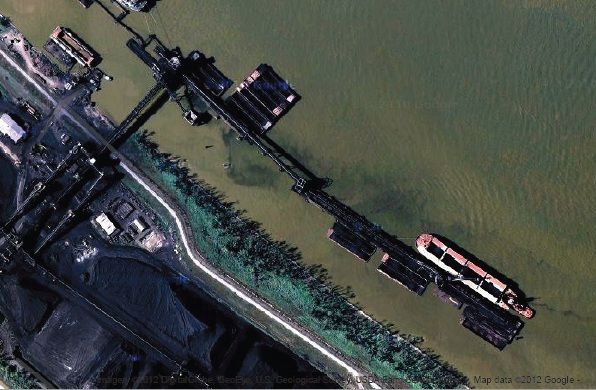 | | IMT Coal Runoff |
Local residents know that despite company promises, coal export terminals aren't good neighbors. Just a mile or two downriver from the proposed RAM site sits Ironton, a historic African-American community founded by freedmen after the Civil War. A couple miles further downriver is the Kinder-Morgan owned I.M.T. coal export facility, and across the river from it, the United Bulk coal export facility, both slated for expansion. Kinder-Morgan (a spin-off of the infamous Enron) has been cited for violating environmental laws on several occasions, including bribing fishermen to illegally dump toxic waste into the Pacific and for causing a massive fish kill on the Willamette river in Oregon (an event not unlike the Pearl River fish kill here). Google Earth satellite maps clearly show Kinder-Morgan's IMT contaminating the Mississippi with coal dust. Many residents of Ironton are acutely aware of the air quality problems and dust that originate with the coal terminals downriver, and don't want to be sandwiched between a third coal terminal.
The Sierra Club is committed to doing everything it can to stop dangerous proposals like the RAM terminal from being built here in Louisiana. To this end, the national Beyond Coal campaign has entered into a special agreement with the Delta Chapter to help fund organizer staff time (that's me) to work on this project. But I can't do it alone. To win, we'll need the help of community activists, local leaders, and volunteers like you. The RAM terminal threatens to destroy vital parts of our natural and cultural heritage. Our fragile and disappearing coast, along with the unique cultures and communities that populate it, are a key to Louisiana's economic and cultural survival and sustainability. Big Coal and companies like BP don't understand this. For them, the Gulf is an easy target and an environmental sacrifice zone, as evidenced by the BP Disaster. With your help, we can show them that Louisiana and the Gulf Coast are made of tougher stuff, and won't sit idly by as our progress in coastal restoration and cultural promotion is threated by yet another dirty fossil fuel industry.
Sources:
(1) US Energy Information Administration. http://www.eia.gov/coal/data.cfm#consumption
(2) "Armstrong Coal Opening new terminal on Mississippi." McGraw-Hill Co., Platts News Service. http://www.platts.com/RSSFeedDetailedNews/RSSFeed/Coal/6905697(3) "Surface Transportation Board Authorizes Tariff Rules on Coal Dust but Strikes Down Specific BNSF Tariff" Troutman Sanders LLP, Washington Energy Report, http://www.troutmansandersenergyreport.com/2011/03/
|
|
Environmental Good Guys in the Recent
Louisiana Legislative Session
Our thanks goes to "Environmental Good Guys" in the recent session of the Louisiana legislature who introduced and fought for environmentally friendly bills that are of interest to Sierra Club members. Our list of environmental good guys is small but growing as we increase support and visibility for environmental issues in Louisiana. Our list would include the following:

Stephen Ortego Dem. represents district 39 which includes parts of Lafayette and St. Landry Parishes. Rep Ortego was serving his first term this past legislative session. He introduced and fought for several good bicycle bills, introduced a Sierra Club resolution to have Bayou Teche studied for inclusion in the state's scenic rivers system, and he asked hard questions on bills in the governor's agenda to radically change public education, sell state assets, and cut state employee pensions. Rep Ortego was active in legislation to provide for use of natural gas fueled vehicles in the state fleet, and was very instrumental in defending the University of Louisiana at Lafayette Medical Center from critical budget cuts.

John Bell Edwards, Dem. district 72 represents East Feliciana, St. Helena and Tangipahoa parishes. Rep Edwards introduced and carried to successful conclusion HB 957 which provides for the disclosure of the composition of hydraulic fracturing fluids. This bill writes into law and strengthens requirements that are included in rules recently promulgated by DNR Office of Conservation, and are comparable to laws on the books in other states where hydraulic fracturing for natural gas is occurring.

Senator Fred Mills Rep., district 22, St. Martin Parish put up a great fight but was not successful in getting legislation to require a federal standard EIS to assess the impact on the Chicot Aquifer of the proposed expansion of the Jefferson Island salt dome gas storage facility. The project proposed by AGL Resources would draw huge amounts of fresh water from the aquifer and discharge saline wastewater to the gulf. Industry ganged up on Senator Fred fearing a precedent that would be set by the proposed legislation. Citizens in the area of Lake Peigneur were leading the effort and were greatly disappointed by the failure of proposed legislation to get out of committee.
 Representative Walter Leger Dem. district 91, New Orleans proposed two bills of interest to the environmental community. HB 681 would have removed the preemptive authority of banks to disapprove loans made for energy efficiency improvements to industrial facilities in sustainable energy financing districts. This would have cleared an obstacle that has prevented any such loans from being made. The bankers were against it and were able to stop the bill in committee. The failure of HB 681 means that the existing sustainable energy financing district law which was fatally amended by the banking lobby remains in effect. The law needs to be fixed in order to regain its intended positive effects on job creation and energy efficiency improvements in buildings. Representative Walter Leger Dem. district 91, New Orleans proposed two bills of interest to the environmental community. HB 681 would have removed the preemptive authority of banks to disapprove loans made for energy efficiency improvements to industrial facilities in sustainable energy financing districts. This would have cleared an obstacle that has prevented any such loans from being made. The bankers were against it and were able to stop the bill in committee. The failure of HB 681 means that the existing sustainable energy financing district law which was fatally amended by the banking lobby remains in effect. The law needs to be fixed in order to regain its intended positive effects on job creation and energy efficiency improvements in buildings.
A big success for Rep Leger was his introduction of the Louisiana First Hiring Act which has been signed into law as Act 414 by the governor. The Act provides that preference will be given to hiring eligible Louisiana workers for contract work performed for the Office of Coastal Protection and Restoration with funds from the RESTORE Act or settlement funds from BP. Work performed to implement the Comprehensive Master Plan for Coastal Protection is also included. This legislation is born out of our bad experience with out of state workers getting so much of the cleanup work after hurricane Katrina.
 Senator J. P. Morrell Dem. district 3, New Orleans proposed three pieces of legislation to protect children from exposure to lead in buildings. The laws require owners of certain child-occupied facilities to conduct an inspection for the presence of lead hazards and to disclose results of lead testing, any lead hazards and lead abatement activities. One of the bills requires state and local agencies engaged in lead hazard reduction activities to publish on their Internet website the standards related to those activities. All three bills were passed by the legislature and signed into law by the governor. Senator J. P. Morrell Dem. district 3, New Orleans proposed three pieces of legislation to protect children from exposure to lead in buildings. The laws require owners of certain child-occupied facilities to conduct an inspection for the presence of lead hazards and to disclose results of lead testing, any lead hazards and lead abatement activities. One of the bills requires state and local agencies engaged in lead hazard reduction activities to publish on their Internet website the standards related to those activities. All three bills were passed by the legislature and signed into law by the governor.
Representative Eddie Lambert Rep. , district 59, Ascension Parish tried again to pass a Louisiana Beverage Container Law that would set up a nickel deposit for plastic bottles and aluminum cans. Studies show that states without a container deposit recycle about 30% and states with a container deposit recycle about 70%. The law if successful would be a huge step in de-littering the Louisiana roadsides, woods and waterways. But the grocers, liquor dealers and soft drink distributors don't want to deal with the returned bottles. The proposed law would have created a large state program which would pay for itself only if people redeem the right number of containers. We know this would not have made it past this governor even if it had made it past the lobbyists. But Rep Lambert is right to try something. Maybe a better written bill with less bureaucracy and more private sector involvement would have a better chance next time. Louisiana Beverage Container Law that would set up a nickel deposit for plastic bottles and aluminum cans. Studies show that states without a container deposit recycle about 30% and states with a container deposit recycle about 70%. The law if successful would be a huge step in de-littering the Louisiana roadsides, woods and waterways. But the grocers, liquor dealers and soft drink distributors don't want to deal with the returned bottles. The proposed law would have created a large state program which would pay for itself only if people redeem the right number of containers. We know this would not have made it past this governor even if it had made it past the lobbyists. But Rep Lambert is right to try something. Maybe a better written bill with less bureaucracy and more private sector involvement would have a better chance next time.
 Katrina Jackson Dem. district 16, Morehouse and Ouachita parishes fought for and passed unanimously in both houses HB 1104 to require state agencies administering tax breaks and incentives to report on the cost effectiveness of those incentives. The bill was vetoed by the governor on the lame excuse that the reporting would be burdensome for state agencies. Jackson's proposed legislation would have given us a much better picture of the real value of over 400 tax incentives and exemptions which cost the state budget $6.8 Billion a year. Rep Jackson's bill was right on target. Any claims of state budget shortfall and insufficient funds to support education, public health and environmental goals are phony as long as tax exemptions for big corporations, some extending back to the 1930's, are allowed to continue without scrutiny. This subject is getting much more attention in Baton Rouge. A legislative commission will be looking at the list of tax exemptions and making recommendations before the next legislative session. Katrina Jackson Dem. district 16, Morehouse and Ouachita parishes fought for and passed unanimously in both houses HB 1104 to require state agencies administering tax breaks and incentives to report on the cost effectiveness of those incentives. The bill was vetoed by the governor on the lame excuse that the reporting would be burdensome for state agencies. Jackson's proposed legislation would have given us a much better picture of the real value of over 400 tax incentives and exemptions which cost the state budget $6.8 Billion a year. Rep Jackson's bill was right on target. Any claims of state budget shortfall and insufficient funds to support education, public health and environmental goals are phony as long as tax exemptions for big corporations, some extending back to the 1930's, are allowed to continue without scrutiny. This subject is getting much more attention in Baton Rouge. A legislative commission will be looking at the list of tax exemptions and making recommendations before the next legislative session.
Sierra Club Delta Chapter members should take every opportunity to thank these legislators for their good work during the legislative session. Let them know you are a Sierra Club member and that you like to follow issues related to environmental quality. Politics in Louisiana works by personal relationships. The better you get to know your legislators the more responsive they will be. Talk or send messages to your own legislators about some of these issues and you will be increasing the effectiveness of Sierra Club's lobbying efforts by letting them know that we are out here and we are paying attention.
Woody Martin, Chair
Delta Chapter
(all photos courtesy of the official louisiana.gov website) |
|
RESTORE Act Signed into Law, Now What?
contributed by Jill Mastrototaro, SE Senior Regional Representative Manager and Devin Martin, Delta Chapter and Beyond Coal Organizer
If you have been following coastal restoration issues or BP Oil Disaster recovery efforts, you have probably heard of the RESTORE Act. The driving force behind the bill was to direct 80% of Clean Water Act (CWA) fines BP is expected to pay to the five Gulf states, rather than having all the money sent to the U.S. Treasury as directed by the CWA. Since CWA penalties are assessed per barrel of oil spilled and whether or not BP is found to be grossly negligent, the total fines could range from $5-$21 billion.
As reported in the October 2011 Delta Chapter newsletter, while Sierra Club staff and volunteer leaders agreed that the bill was a step in the right direction in allocating fines back to the Gulf, our support of the legislation was trumped by concerns about the need for safeguards to provide accountability, create tools to engage the public, and support independent science. While many environmental and community groups supported RESTORE and worked to secure its passage, the Sierra Club worked constructively to strengthen the bill to ensure our concerns were addressed.
This past spring a Congressional conference committee began working to reconcile the House and Senate versions of RESTORE, the final version of which was passed by Congress on June 29th as a part of a larger compromise Transportation bill. Nearly the entire Gulf Coast delegation voted for it, and President Obama signed it into law on July 6th. While a full evaluation of the bill's final language is now underway, it is clear that RESTORE lacks important measures to address some of our concerns such as a Regional Citizens' Advisory Council. The Council, for example, would be made up of local resident and community leaders to oversee industry activities and to ensure regulators were properly enforcing laws to help avoid future disasters.
What's more, since the monies coming to the Gulf Coast will be controlled by our governors, state and federal agencies, and other elected leaders, Gulf residents will have little say in how or where the billions of dollars will be spent. Limited public input and oversight is even more disturbing given that RESTORE directs monies for environmental and economic development projects. Though some of these dollars will go toward addressing long-standing environmental challenges like coastal restoration in Louisiana, we have real concerns about the opportunity for monies to be misspent or redirected to projects that have little redeeming value for restoring our ecosystems, families, fisheries, and communities across the Gulf Coast.
The Sierra Club will continue to remain vigilant in the weeks, months, and years ahead to ensure the monies from this bill and other BP Oil Disaster recovery efforts, like the Natural Resource Damage Assessment process, are used in a meaningful way to support a healthy, sustainable, and vibrant region all Gulf citizens deserve.
|
|
The Energy Wars
A major issue of contention in this year's elections is what kind of energy system America should have. The same forces pushing to roll back U.S. environmental laws are also against diversifying our nation's energy system, especially in a way that prioritizes sustainability.
The Sierra Club is among the organizations pointing out that increasing our reliance on more polluting sources of energy will hurt the economy. A new Sierra Club report, "Locked In", examines how coal plants are economically as well as environmentally risky.[i] Their high capital costs, along with pollution and health effects, make them a bad investment. There are coal plants that have re-engineered to keep themselves in the game - but they have been hurt by the anti-regulatory suits filed by industry interests and some states showing that regressive efforts cause economic as well as environmental damage.[ii]
Coal is used to produce electricity, but energy for transportation is another source of conflict over what kind of future to build for. A common myth is that rises in oil and gasoline prices are being caused by environmental regulations - especially those that still protect a few areas of public lands and waters. The Baton Rouge Group of the Sierra Club has argued against these myths that are being spread by politicians and pundits.[iii] (Strangely the myth doesn't apply when prices fall...) U.S. domestic production has actually increased dramatically over the past several years.[iv]
Another myth is that American oil and gas resources are "locked up" by regulations - but this fails to account for the fact most public lands are open for leasing, or that large areas of public land that are leased are not being drilled on.[v] Getting past the myths would help our country arrive at a sustainable energy policy. |
|
Don't Forget the Attack on America's Environment at Election Time
Contributed by the Baton Rouge Group of the Sierra Club
Members of the Sierra Club know that since the 2010 mid-term election, an unrelenting attack on America's environmental laws, policies, and regulations has been led by the GOP leadership in the House and Senate. The record in the House has been truly appalling - bills have passed to curtail funding, eliminate programs, and restrict implementation of laws and rules protecting our air, land, water, and public health.[i]
These laws include landmark legislation that has made America a healthier - and more prosperous place to live - the Clean Air Act, Clean Water Act, the Endangered Species Act - and the agencies that enforce them, especially the Environmental Protection Agency. Several of the GOP Presidential candidates called for eliminating the EPA entirely.[ii]
In the face of these attacks, the EPA has continued to enforce the law, and carry out the regulations required by the bills passed by Congress (prior to this one.) These have included reductions in carbon emissions, mercury pollution, and releases from drilling.[iii]
An often repeated justification for these extreme attacks is the claim that the EPA and regulations in general, are "killing jobs." Numerous studies show otherwise - the net economic effect of regulations is positive.[iv]Why the alternate reality in Congress? The money from special interests plays a big role.[v] These are not partisan conclusions - they reflect a sad reality. Republican members of the Sierra Club need to engage their candidates and members of Congress on this. They have a better chance of being listened to than anyone else. |
|
Delta Chapter Celebrates 120 Years of Conservation

On May 28, 1892, legendary conservationist John Muir founded the Sierra Club. From its beginnings as a small, dedicated group of pioneer conservationists working to protect the unspoiled beauty of the Sierra Range, the Club has grown to become the largest and most influential grassroots environmental organization in the country, with over 1.4 million members and supporters today. On May 28, 2012, the Sierra Club marked 120 years as a society promoting conservation through civic engagement.
To celebrate this landmark anniversary, the Delta Chapter and Acadian Group held an Anniversary Bash and Fundraiser at the world-famous Blue Moon Saloon in Lafayette, Louisiana. Attendees enjoyed fresh strawberries, homemade Jambalaya (meat and vegetarian), and homegrown summer salad. Local Sierra Club members donated items for a silent auction, including nature photographs and a Civil War era historical map of the Atchafalaya Basin. The highlight of the night was the fantastic live music performed by classic rock bands Stranger than Friction and the Zig Zag Wanderers. The event netted a few dollars for the Chapter, with 50% of all proceeds going to help the search to find Mickey Shunick, who went missing from Lafayette on May 19.
Thanks to all the members and volunteers who helped to make this event a success. Because it was such a blast, the Delta Chapter and Groups are committed to doing more fun events like this in the months and years to come!
|
|
Earl's Pearls

Bringing his unique slant to the war against the environment for over 30 years. |
|
SIERRA: THE REALITY SHOW
Retirement from real work means that I have more time to sprawl in front of the television and be entertained (?), enlightened (?), educated (?), and enthralled (?) by the rich quality and variety of what is euphemistically called "Reality TV." I can watch faux judges preside over divorces and petty squabbles; I can watch low-life thugs engage in technically legal vehicle repossessions. There are bounty hunters and varmint exterminators, endless videos of police chases, and a whole group of programs about trashy women ("housewives"?) with too much money and too little class.
If someone really wants to see the lower spectrum, s/he can turn on "Jersey Shore" and watch young adults slathered in bronze toner curse, copulate, get drunk, and fight with each other - and get paid enormous amounts of money for proving that Western Civilization is in irreversible decline. Elsewhere the Sisters Kardashian teach us about industrial-strength narcissism and that one can make a lot of money simply by being a celebrity, with no visible talent or contribution to society. White Trash has become a job description.
And then there are the Louisiana contributions to reality television. For a few months martial-arts star Steven Seagal tooled around as a Jefferson Parish Sheriff's deputy; now there is a show called "Cajun Justice" in which the camera roams with the Terrebonne Parish sheriff looking for drug dealers, shrimp thieves, and their ilk. One would think from this program that the populace of the Louisiana wetlands has not changed since the henchmen of Jean Lafitte poled their pirogues down the bayous. There is even a Cajun edition of the popular shows filmed in pawn shops.
The most popular of all current reality shows is "Swamp People," in which camera crews tag along with alligator hunters and other denizens of the Louisiana wetlands during alligator trapping season. The characters in the show all do their best to act like cartoon stereotypes of Cajuns, even those who clearly are not of that heritage. Bad teeth and nicotine stains enhance the apparent reality.
What's all this got to do with the Sierra Club? With all the interest in (or is it more like fascination for a train wreck?) Louisiana by film and video makers and their audiences, the Sierra Club should get into the action and start filming. Think about it: "Delta Chapter - The Real World."
We could get a group of Sierrans together in a big beach camp on Grand Isle, with the omnipresent voyeuristic camera crews present, and explore the nature preserve in the middle of the island, walk the beach in search of BP oil sludge, hang out in the big Wildlife and Fisheries lab to test shrimp and crabs for presence of dispersant chemicals. All of that is during the day. In the evening there could be night fishing and a crab boil at the camp. Reality Sierrans would then hang around drinking organic green tea and white wine while arguing whether Bobby Jindal or Mike Foster was a worse governor for the environment.
Who would our reality stars be? In New Jersey there are peoplewho are chronologically grown-ups running around loose with names like "Jwow" and "Snookie" and "The Situation." Those are thankfully not names one would find in Louisiana, but maybe we could locate somewhere in the Bayou State a "Bubba Boo," a "Daw-Lene," a "L'il Noo-Noo," and maybe a "T-Neg." People with such names have at times held elected office in Louisiana. (editor's note: Our swamp hero is Dean Wilson).
Here come da judge! Conducted in front of cameras, the Delta Chapter could have an Enviro-Court, before which would appear accused polluters, litterers, poachers, and other violators. Presiding could be a couple of our most distinguished Sierrans, wise sages who have been around since the beginning of Sierra time in Louisiana: Honorable Barry Kohl and Honorable Harvey Stern. "All rise!"

It will be hard to compete with the alligators trappers of "Swamp People," but camera crews could follow a Delta Chapter canoe trek to the swamps of the Barataria Preserve of the Jean Lafitte National Historical Park near Crown Point and record their frustration and anger as the camera sweeps across Bayou des Familles and Bayou Coquille, erstwhile canoe trails, in which no surface water is visible, blocked by thick vegetation. There will be discussion of what, if anything, the park service is doing to open up the canoe trails listed on its maps and web site. There will be the usual choice words for the agency we all love to hate, the U.S. Army Corps of Engineers. With no canoeing available, Sierrans could then engage in speculation of how and why the South American university president got lost in Barataria and why it took the park service four days to find him.
Get real, Sierrans.
Earl Higgins
|
|
In Memoriam for Dr. Donald Bradford
Dr. Donald Muir Bradburn, M.D., long-time Louisiana conservationist and photographer. Dr. Bradburn's death on July 4, 2012, marks the end of a long life devoted to saving and photographing Louisiana's wetlands. He was a true hero for Louisiana's wetlands, and all of his awards and honors are well-deserved. Dr. Bradford was a founding member of the Delta Chapter.
(Reprinted from the Times-Picayune's Obituary Section):
| |
He is survived by his wife of 53 years, Anne Chappell Strickland, two daughters: Muir Dean of Durham, NC and Helen Werum of Stuttgart, Germany; and three grandchildren: Ian, Anne and Sarah Werum. Photography combined with natural history has been a lifelong avocation for Dr. Bradburn, Chief of Pathology at Touro Infirmary from 1974 to 2006. Beginning about age six with a Brownie Box Camera and trips to the Audubon Zoo, learning darkroom techniques in a converted laundry room while still in grammar school, his first "real" camera was a Leica III-F purchased in Japan while he was serving in the U.S. Navy during the Korean War.
His photographs of the Mississippi barrier islands were the cornerstone of his fifteen year effort to have two small islands, Horn and Petit Bois, included in the National Wilderness system. Now a part of the Gulf Islands National Seashore, wilderness is the ultimate protection available to insure that these island remain preserved untouched for posterity. Using the 35 mm format with Leicas, Nikons and finally digital Canons, his photographs have appeared in Natural History, Smithsonian, Audubon, Sierra Club, Nature Conservancy magazines as well as in National Geographic. His work is represented in the Audubon Encyclopedia of Birds and was featured in an award winning WYES-TV documentary, "the Fragile Barrier".
He has had exhibits in the Mississippi Natural History Museum, Jackson, MS, the Eastern Shore Art Museum of Point Clear, AL, Studio 8 in New Orleans, the New Orleans Public Library, the Walter Anderson Museum of Art and more recently at the Garden District Gallery in New Orleans. He was awarded the National Sierra Club's prestigious Ansel Adams Award for Conservation Photography in 1971. In 1975 the Mississippi Wildlife Federation named Dr. Bradburn Conservation Communicator of the year. In 2011 the University Press of Mississippi published his book, "Last Barriers: Photographs of Wilderness in the Gulf Islands National Seashore". No local services have been announced at this time. Kindly omit flowers. Memorials to the Louisiana Philharmonic Orchestra, 1010 Common St., Suite 2120, New Orleans, LA 70112, the Walter Anderson Museum, 501 Washington Ave., Ocean Springs, MS 39564 or the conservation organization of your choice. Tharp-Sontheimer Funeral Home of Metairie in charge of arrangements. Condolences may be expressed online atwww.tharpsontheimer.com. |
|
|
Monarch of the Swamp Honored
MARRERRO, LA: Honor "the Monarch of the Swamp" was honored at a special ceremony on Tuesday, June 19, at the Barataria Preserve of Jean Lafitte National Historical Park and Preserve. Representatives of the park, the State of Louisiana, the Louisiana Bicentennial Cypress Legacy, and the Atchafalaya National Heritage Area will mount a plaque near the Monarch, an old-growth baldcypress tree estimated to be about 700 years old. The Monarch is located just off the Bayou Coquille Trail in the preserve, about a quarter mile from the Bayou Coquille Trail parking lot. Tithe preserve is located at 66588 Barataria Blvd. in Marrero (near Crown Point). More information is available at 504-689 9-3690 ext. 100 or at www.nnps.gov/jela.
Every Louisiana Bicentennial Cypress Legacy tree must be at least 200 years old and growing in a place currently protected from logging. With the support of the Louisiana Bicentennial Commission, the Louisiana Bicentennial Cypress Legacy (http://wwww.lapurchaasecypresslegaacy.net/) works to raise awareness of the value of swamps and the threats to their survival by linking old-growth trees like the Monarch to major events in Louisiana history like this year's bicentennial of Louisiana statehood. According to Louisiana Bicentennial Cypress Legacy creator Harvey Stern, such landmarks create an ideal opportunity to link Louisiana's cultural and historic heritage with stewardship of the state's ecological inheritance.
"Jean Lafitte is honored that 'the M monarch of thee Swamp' has been chosen as a legacy tree," said Barras aria Preserve Supervisory Park Ranger Aleutian Scott. "The Monarch is well known to the crowds of people who walk the Bayou Coquille Trail every year. It serves as a symbol both of the people and industries who built Louisiana's past and of new ventures like ecotourism. The Monarch is a reminder that the swamps and wetland in a few places like the preserve once covered this entire area."
 | | MEMBERS OF AUDUBON COUNCIL INCLUDING SIERRA CLUB LEADERS BARRY KOHL AT FAR LEFT, HARVEY STERN NEXT TO PARK RANGER , FRANK EHRET AND WILLIE FONTENOT IN FOREGROUND |
wwww.nps.gov
About the National Park Service: Moore than 20,0000 National Park Service employees care for America's 397 national parks and work with communities across the nation to help preserve local history andcreate close-to-home recreational opportunities. Learn more at www.nps.gov.nps.gov. (Article exerpted from NPS press release)
... |
|
Rutherford Beach Trip Documents "Pristine" Beach
In Cameron Parish, Southwest Louisiana, 15 miles east of where the Calcasieu River lets out into the Gulf in an area known as the "Cajun Riviera," sit Rutherford and Hackberry Beach. Last summer, Acadian Group members led by Chair Harold Shoeffler set out on a beachcombing trip there, and along with shells, interesting pieces of driftwood, and rosy cheeks, the group came back with some other curious items: a road sign from Mexico, a perfectly good hand saw, some fresh (and not so fresh) coconuts, and a crab trap or two.
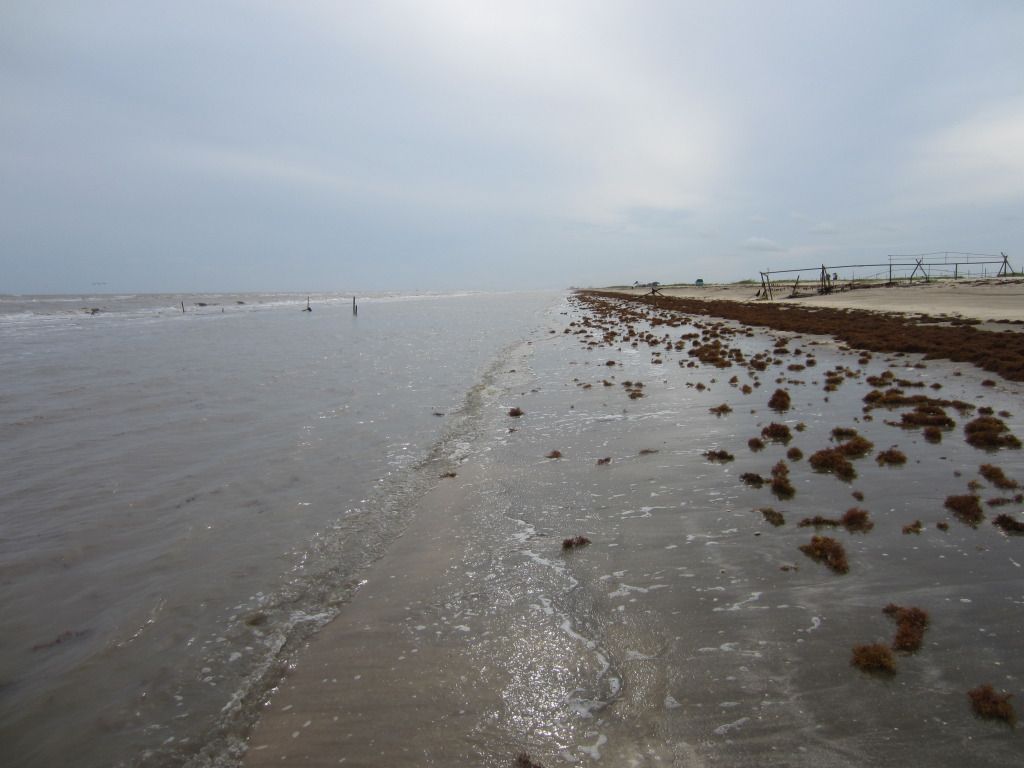
Rutherford beach has no hotels, marinas, casinos, or any other large developments, and what few camps existed there were mostly wiped out by Hurricane Rita. As a result, there is no one to sweep the beach for tourists or residents, and the trash that rolls in with the tide begins to accumulate. Rutherford is a perfect example of what a "pristine" beach along the Gulf looks like in 2012-plastic bottles, shoes, garbage of all sorts from shrimp and oilfield boats...basically anything that gets thrown out into your local waterway will eventually work its way into the Gulf, and either sink or wash ashore. There's also the issue of water quality. According to a recent report by the NRDC, Cameron Parish beaches are the worst in the nation for contamination-nearly 44% of all water samples taken there were over the safe limit for levels of bacteria. Grand Isle fared a bit better, with only 8% of samples taken showing unsafe levels.
On June 30th of this year, a small group of Sierra Club members and their friends and families set out to document the abundant types of trash on the coast. Here's what they found: on average, each 10 yard stretch of beach-from shore to grassline-contains 19 plastic bottles, 6 glass bottles, 15 plastic fragments, 4 metal containers or fragments, 2 plastic toys, a half a light bulb, 3 shoes, and about 5 feet of nylon rope. Other interesting items included a broken cooler, caulk guns, fishing nets, a push broom, giant pieces of yellow foam, a propane tank, a broken fishing basket, and one of those little rubber bracelets people wear to show their support for some cause (we're betting that the cause wasn't "Protect the Environment, Don't Litter"). All of these things were found along Hackberry beach, an area adjacent to Rutherford that has no car access and therefore has very little human activity.
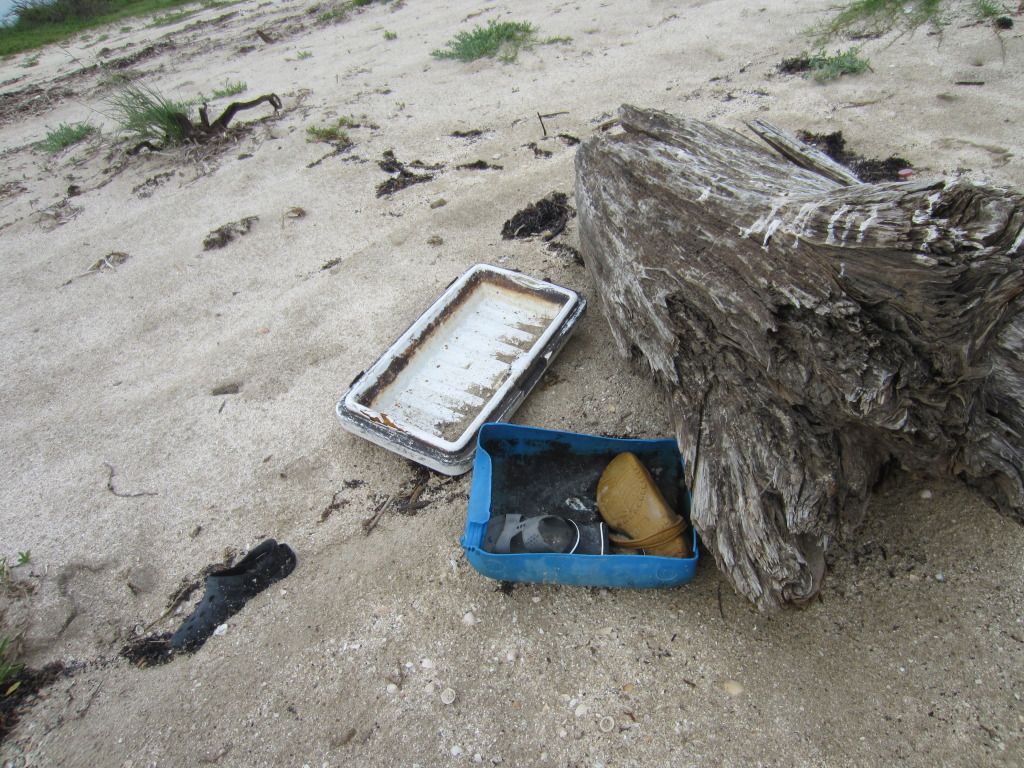
The Sierra Club is dedicated to helping to educate the public on the poor state of our beaches, and steps we can take to start to clean them up. The Acadian Group will be sending out a press release about its findings to raise awareness and hopefully recruit new members to help in the cause. If you'd like to do something, call or write us at one of the contacts listed in this newsletter. |
|
| Leave an Environmental Legacy

|
| You can make a lasting difference for Louisiana's fragile environment. Whether you have a large or modest estate, the people and causes in your life are honored by your remembrance. We'll invest your bequest or memorial gift in the work you care most about-protecting Louisiana. Working with Sierra Club's gift planning team, you can create a legacy that has meaning for you and saves taxes for your heirs. Drafting or updating your will is easier than you think. Sierra Club can help. Go to www.sierraclub.org/giftplanning for more info, or call our Chapter Chair Woody Martin at 337-298-8380. |
|
Use this area to provide your subscribers information about your organization.
Sincerely, |
|
|
|